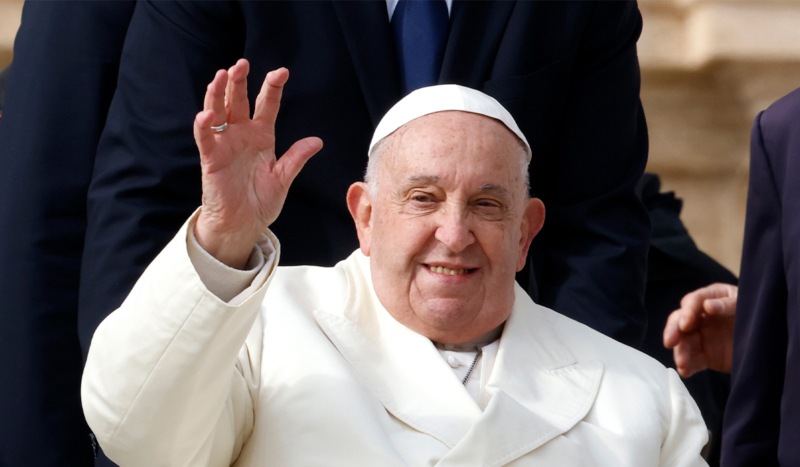
Shutterstock
CV NEWS FEED // Pope Francis requires a longer hospital stay than initially reported, the Holy See Press Office reported Feb. 17.
The Pontiff was admitted to the Gemelli Polyclinic Hospital in Rome on Feb. 14 because his bronchitis, which he had been suffering from for more than a week, had worsened, as CatholicVote reported.
“The results of the medical tests carried out over the past few days and today have shown a polymicrobial infection of the respiratory tract, which has led to a further change in therapy,” a Feb. 17 Vatican News article stated. “All tests carried out to date are indicative of a complex clinical picture that will require appropriate hospitalization.”
The Holy See Press Office said in its Monday evening update for reporters, according to the latest Vatican News article on the Pope’s condition, that the Pope does not have a fever, his condition is “stable,” and he is following the prescribed treatment.
“This morning, he received the Eucharist and then undertook some work and some reading,” the article said.
The Pope’s Feb. 19 General Audience has been canceled, the Vatican News report from earlier in the day stated. However, the Pope “is in good spirits,” according to Holy See Press Office Director Matteo Bruni. On Feb. 14 and 15, Pope Francis was still able to make his daily check-in calls to the parishioners of the Holy Family Parish in Gaza, Father Gabriel Romanelli said.
“We heard his voice. It is true, he is more tired. He himself said, ‘I have to take care of myself,’” Fr. Romanelli said, Vatican News’ earlier Feb 17 report stated. “But you could hear the clear voice, he listened to us well.”
Yet, on Feb. 16, the Pope sent a written message to the priest’s phone, thanking him for the parish’s prayers and giving the Holy Family community a blessing, the article said.
A translated version of the Italian news outlet Open’s Feb. 17 report on the Pope’s condition stated that polymicrobial infection of the respiratory tract “can be difficult to combat.” When more than one pathogenic microorganism, such as bacteria, viruses or fungi that cause diseases, are present in the respiratory system, that can increase toxin production, treatment resistance, antibiotics resistance and the testing necessary to identify each microorganism.
“Since multiple pathogens are acting simultaneously, treatment must address all of them,” the translation stated.
Antibiotics, antiviral medications, antifungal drugs may all be needed, based on which types of microorganisms are involved, to treat signs and symptoms, which frequently include continuous fever, fatigue, breathing challenges, muscle pain, joint pain and severe cough, according to Open.
“In more severe cases, symptoms may also include a rapid heart rate and recurring cyanosis, a condition caused by temporary oxygen deprivation,” the translated article stated.
According to Open, people who are more likely to acquire polymicrobial infection of the respiratory tract include people who are elderly or have chronic respiratory diseases.
Religious leaders have called for people to pray for the Pope.
“Regardless of personal opinions on his leadership, let us unite in prayer for his health and recovery, entrusting him to the mercy and care of Our Lord,” Catholic apologist and podcaster Patrick Coffin said in an X post Feb. 17.
Bishop Joseph Strickland, whom the Pope had removed from the office of the Diocese of Tyler, Texas, encouraged people in another X post Feb. 17 to pray for the Pope’s “eternal salvation, his conversion to the Sacred Heart of Christ and that any suffering he endures may draw Him closer to God, Father, Son and Holy Spirit.”
Vatican News’ report on the Monday night update stated that “Pope Francis is touched by the numerous messages of affection and closeness that he has been receiving in recent hours; he especially wants to extend his thanks to those who are hospitalized at this time, for the affection and love they have expressed through drawings and messages of good wishes; he prays for them and asks that they pray for him.”
